

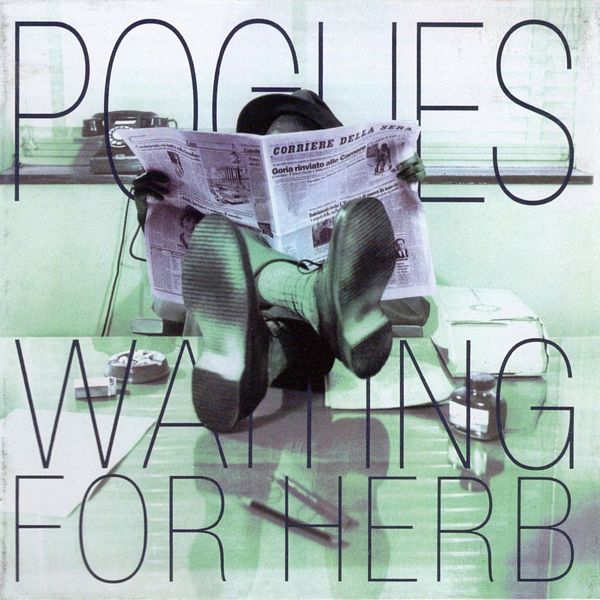 |
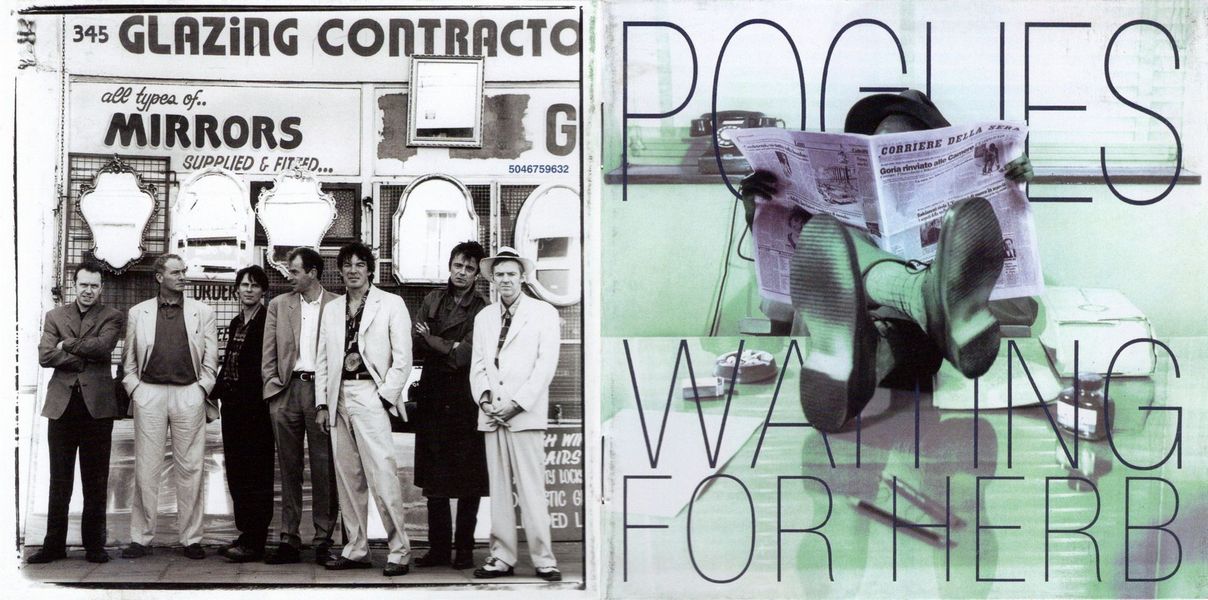
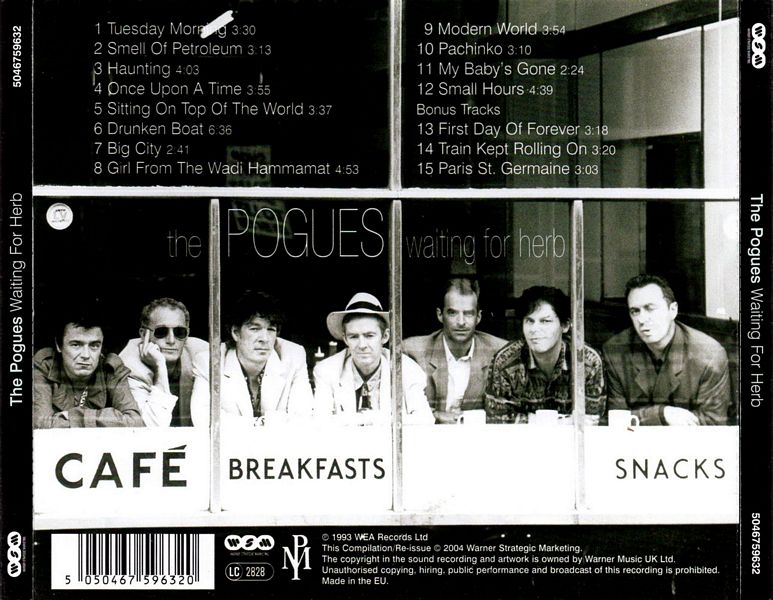
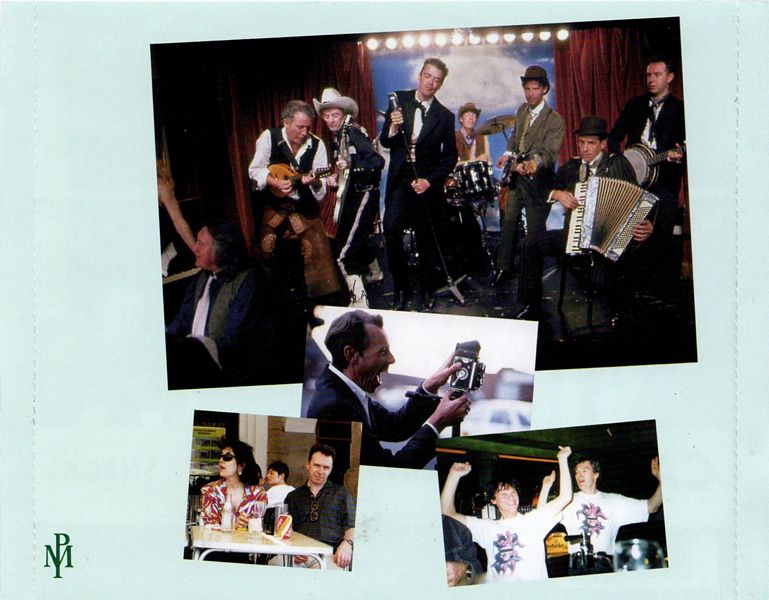
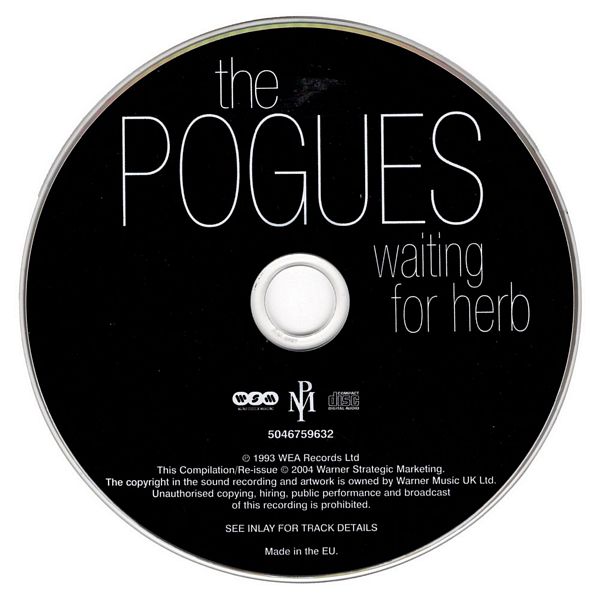 |
| more images |
Sleeve Notes
The Pogues made great records and played great gigs but the glory are the songs. This is what will last. Old ones lovingly restored to their pristine attitudes, correctly interpreted to the now, and originals as timeless as if written in some smoky corner 300 years ago or a piss-stinking bus sheIter in London last week.
The words tumble and catch, the band plays, and being Irish in the 21st Century makes a sense denied me in those long years past in Ireland itself.
This is the noise of a connected Ireland, not an insular frightened ghetto of the head but a people inside or outside who define themselves within a world that is not a small island off the western shores of Europe. It is everywhere and everybody is welcome to come in. It's the Ireland I imagined and was desperate for a long time ago now. It is the noise of the always outside who have no desire to come in save on their terms. It's cultural revolution stuff. A great reclaiming from those who made it by those whom it was made for.
Great words. Great music. Great band. Great art.
Sir Bob Geldof
"People came maybe expecting a wake or funeral — and then the corpse wakes up!"
That was Spider Stacy in 1993, after the release of the Pogues' sixth album, Waiting For Herb, an album remarkable for many things, but probably most remarkable of all being the fact that it was the first record the band had made without its founder member and lead vocalist, Shane MacGowan.
The last few years had been turbulent even by the exciting standards of the Pogues. Despite rallying brilliantly on their previous album, Hell's Ditch, the band had found themselves being forced to become flexible as MacGowan's health and reliability fluctuated, often in unison. In the end, they had no choice but to ask the man whose vision had caused them all to come together to leave. Not that the band felt they had a choice. As Spider said at the time: "If we hadn't kicked him out, nature would have taken its course." Philip Chevron said: "The actual act of asking him to leave the band was the hardest part. But when we finally confronted him — after having put off the decision for so long — he wondered why we had taken so long."
"To say Shane was the spirit of the band is to miss the point entirely and listening to people saying that was part of the problem," Stacy added.
Either way, Shane MacGowan and the Pogues were no longer an item. After launching Shane on his solo career, the band undertook tours with a new vocalist, the producer of Hell's Ditch, and an old friend, former Clash singer Joe Strummer.
Strummer went way, way back with the Pogues. They had supported his own relaunched band, the Clash Mark II, on tour at the start of their own career, and he had been an early champion of their work. They had all appeared together in one of the most ramshackle films of all time, Alex Cox's Straight To Hell, along with another Pogues producer, Elvis Costello (the film's other two stars, Courtney Love and Grace Jones, may actually be among the only people on earth to have never worked with the Pogues). And now Strummer had toured with the band as a substitute vocalist for Shane. They had acknowledged their debt to the great man by including the Clash's 'London Calling' in their set.
"He saved the Pogues on two counts," said Spider, meaning that Strummer stepped in when he was needed, and then he went away again. "There is a very real risk we would have been submerged by him."
'Joe Strummer helped restore confidence within ourselves when it was an obviously low point," said Chevron. "He showed us that we could carry on … Joe felt it was great while it lasted, but it wouldn't have worked out in the long run, because we never wrote any music together. I don't think that Joe wanted to spend his life touring the world, which is what you have to do if you're in the Pogues."
After Strummer's departure, the band found themselves reliant on their own self-sufficiency. Live, this was not so much of a problem. Spider was able to take Shane's place, and the rest of the band had, for a long time, been perfectly able to fill the remainder of any concert with their enormous repertoire of songs. In Philip Chevron and Jem Finer the Pogues had two fine song-writers, and in Jem Finer the band still had one of their composing mainstays. Other members — notably Darryl Hunt and Andrew Ranken — were now also contributing songs.
When it came to recording an album, however, it was always clear that Shane MacGowan's absence would be an obvious one. The results were, fortunately, surprising. From Darryl Hunt's pounding 'Big City' to the single Tuesday Morning', Waiting For Herb is a record that stakes its own claim to existence.
"It sounds like I'm slagging off the album," said Spider at the time, "but it is quite slick. The first time I heard it played back, I was wondering: Is that us?"
In some ways, the consolidated sound of Waiting For Herb must have come as a relief to the band after years of head-spinning near chaos.
"There wasn't any problem with which direction we were going in," Spider said at the time, "There was a little uncertainty as to whether we were going to be going in any direction at all."
Instead, the band referred to the record as a transitional one. It may not have quite turned out that way, but for a holding operation, it's pretty good.
"I wouldn't try to fill Shane's shoes. That would be foolish of me," said Stacy, "I can only try to fill my own. The band was very supportive, I have to say that. I don't think I'm as good, or that I'll ever be as good, as Shane is capable of being when he was on form, but that doesn't necessarily follow that I can't do it."
"The fact is we're completely happy without Shane, and he's happy without us," said Chevron. "MacGowan has his own band, his own album and his own living to make — he didn't just end up in the gutter because we bagged him."
Waiting For Herb, accordingly, has as one of its greatest achievements the fact that it doesn't sound like an album made by a band who dropped a singer. It sounds like a record made by a group with an existence in its own right.
"It sounds puffed up, but the Pogues as a living thing had become bigger than any of its members. Maybe not bigger, but with a life of its own and its own spirit, independent of anyone," Spider said. "Consequently, when it came time to record, there wasn't even a discussion about making anything other than a Pogues' album. It never occurred to me to do anything other than collect the best songs from the members of the group and get them down with the feel of the Pogues in the grooves."
In this, the Pogues succeeded entirely. From Terry Woods' aptly-named 'Haunting' to Jem Finer's 'Once Upon A Time' (which Finer claims "started off as an attempt to write a song for Rod Stewart"), Waiting For Herb is as varied and eclectic as any other Pogues album And there are surprises, too. Who would have thought that a song called 'Drunken Boat' would be heavily influenced by the work of Arthur Rimbaud? Only people who knew that its author, James Fearnley, was a widely-read man. Similarly, there's 'Pachinko', possibly the only song written about a strange old Japanese version of pinball. The pinball wizard in this case is Jem Finer.
"The first time I went to Japan I wondered what Pachinko parlours were," said Jem at the time. "The second time I went in one and tried to play, but was hopelessly lost. The third time I bought a book on how to play but still made little headway. The fourth time an old Japanese man came and stood by me. He rested his hand on mine and subtly guided me to the jackpot."
The Pogues, clearly, were no more a pub band with a thing for beer trays. And their determination to stay the course was a noble thing. The last word should go to newly-minted lead vocalist Stacy.
"It was Shane who was wandering away from the concept of the group," he said. "I'm not sure I can articulate what the Pogues are about, but we knew we had to close ranks and retain our identity. How well we've achieved that is for other people to judge."
And now, on this expanded version of one of the Pogues' most under-rated albums, you can.